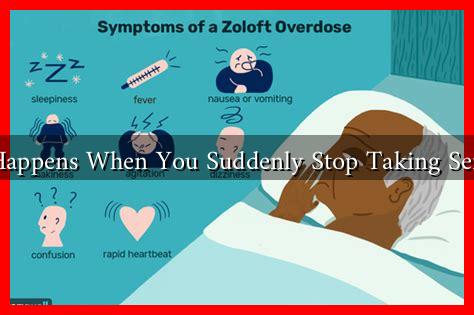-
Table of Contents
What Happens When You Suddenly Stop Taking Sertraline
Sertraline, a selective serotonin reuptake inhibitor (SSRI), is commonly prescribed to treat depression, anxiety disorders, obsessive-compulsive disorder (OCD), and post-traumatic stress disorder (PTSD). While it can be highly effective, many individuals may find themselves in a situation where they need to stop taking the medication. This article explores the implications of abruptly discontinuing sertraline, the potential withdrawal symptoms, and the importance of consulting healthcare professionals.
Understanding Sertraline and Its Role
Sertraline works by increasing the levels of serotonin in the brain, a neurotransmitter that plays a crucial role in mood regulation. By enhancing serotonin availability, sertraline can help alleviate symptoms of various mental health conditions. However, the body can become accustomed to the presence of the medication, leading to potential complications when it is suddenly stopped.
The Risks of Abrupt Discontinuation
Stopping sertraline suddenly can lead to a range of withdrawal symptoms, often referred to as “discontinuation syndrome.” This syndrome can manifest in various ways, and the severity and duration of symptoms can vary from person to person. Some common withdrawal symptoms include:
- Dizziness or lightheadedness
- Flu-like symptoms (fatigue, muscle aches)
- Insomnia or vivid dreams
- Increased anxiety or agitation
- Changes in mood, including irritability or sadness
- Gastrointestinal issues (nausea, diarrhea)
According to a study published in the Journal of Clinical Psychiatry, approximately 20% of patients experience withdrawal symptoms when discontinuing SSRIs like sertraline. These symptoms can begin within a few days of stopping the medication and may last for several weeks.
Case Studies: Real-Life Experiences
Understanding the experiences of others can provide valuable insights into the effects of stopping sertraline. Here are two illustrative case studies:
- Case Study 1: A 32-year-old woman who had been on sertraline for two years decided to stop taking it due to side effects. Within a week, she experienced severe dizziness, nausea, and heightened anxiety. After consulting her doctor, she learned that tapering off the medication gradually could help mitigate these symptoms.
- Case Study 2: A 45-year-old man abruptly stopped taking sertraline after feeling better for several months. He reported experiencing intense mood swings and insomnia. After a month, he sought help and was advised to resume the medication while gradually reducing the dosage.
The Importance of Tapering Off Medication
Healthcare professionals typically recommend tapering off sertraline rather than stopping it suddenly. Tapering involves gradually reducing the dosage over time, allowing the body to adjust to the decreasing levels of the medication. This approach can significantly reduce the risk of withdrawal symptoms and make the transition smoother.
Some strategies for tapering off sertraline include:
- Consulting with a healthcare provider to create a personalized tapering schedule.
- Monitoring symptoms closely during the tapering process.
- Engaging in supportive therapies, such as counseling or support groups.
Conclusion: Key Takeaways
Stopping sertraline suddenly can lead to a range of withdrawal symptoms that can significantly impact an individual’s well-being. It is crucial to understand the risks associated with abrupt discontinuation and the importance of tapering off the medication under the guidance of a healthcare professional. By taking a thoughtful and informed approach, individuals can minimize withdrawal symptoms and maintain their mental health stability.
If you or someone you know is considering stopping sertraline, it is essential to consult with a healthcare provider to discuss the best course of action. Remember, mental health is a journey, and seeking professional guidance can make all the difference.

